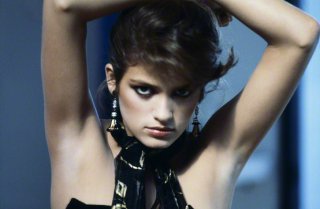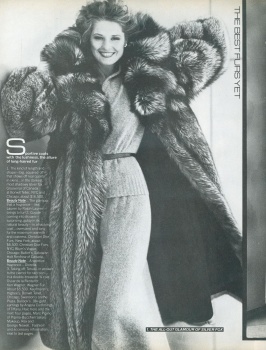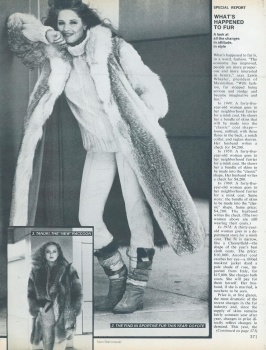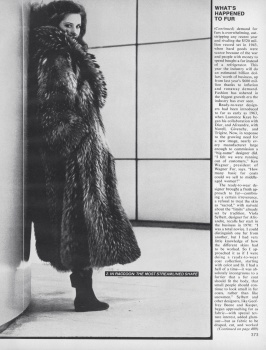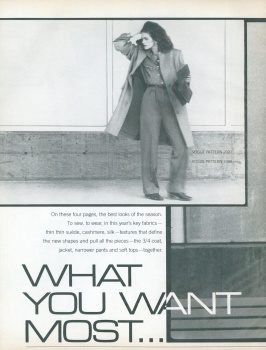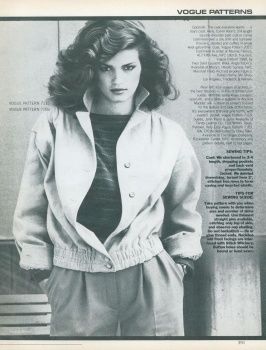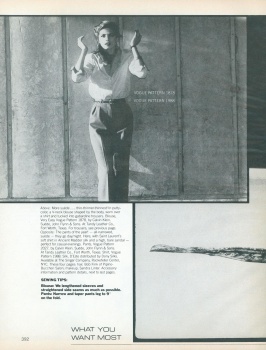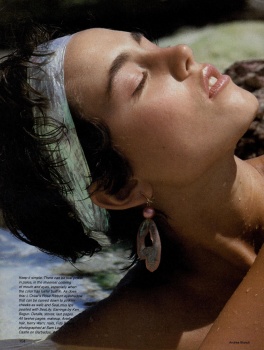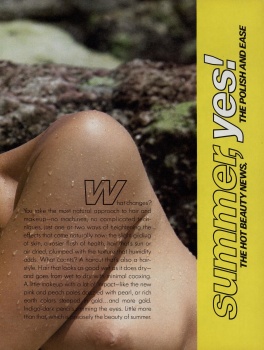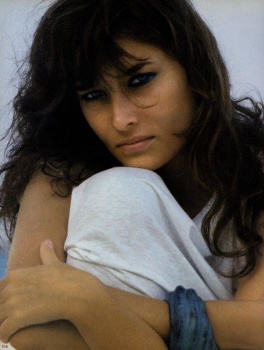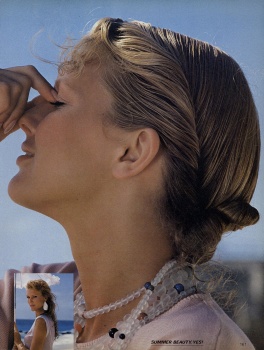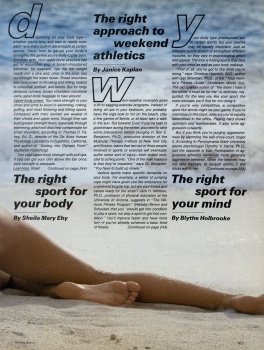-
Announcing... The WINNERS of the 2025 theFashionSpot Awards:
Designer of the Year
Ready-to-Wear Collection of the Year
Haute Couture Collection of the Year
Model of the Year
Photographer of the Year
Stylist of the Year
Magazine Cover of the Year
Ad Campaign of the Year
Congratulations to ALL of our worthy winners! Thank you to our tFS forum members who voted and participated.
You are using an out of date browser. It may not display this or other websites correctly.
You should upgrade or use an alternative browser.
You should upgrade or use an alternative browser.
Gia Carangi
- Thread starter SiennaInLondon
- Start date
- Joined
- Jul 24, 2010
- Messages
- 103,112
- Reaction score
- 67,646
US Vogue October 1978
Beauty & Health | Beauty Collections '78, Color Is It!
Photo Arthur Elgort, Francesco Scavullo, Nobu, Stan Malinowski, Deborah Turbeville, Andrea Blanch
Models Gia Carangi, Rosie Vela, Gia Carangi, Beverly Lee, Rosemary McGrotha, Unknown
Hair Christiaan, Harry King, Garren
Makeup Way Bandy, George Newell, Nairi Moi
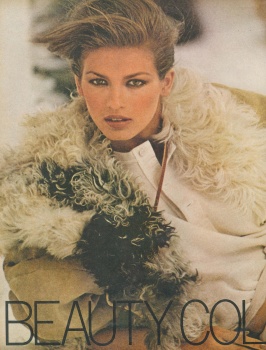
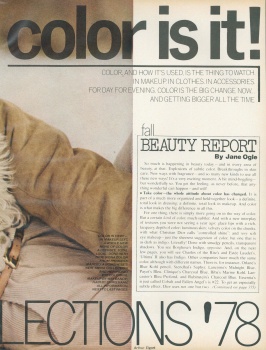
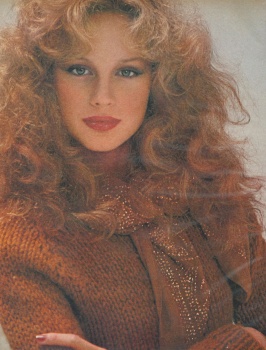
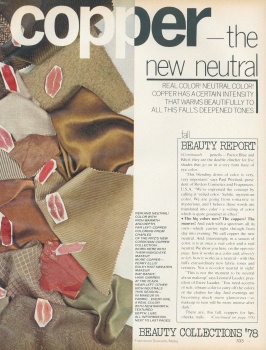
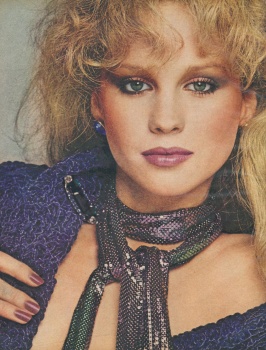
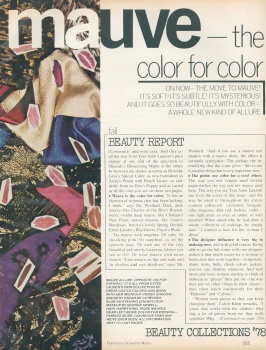
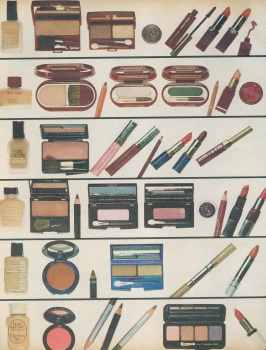
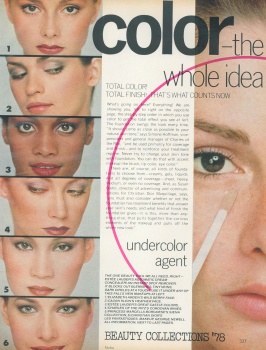
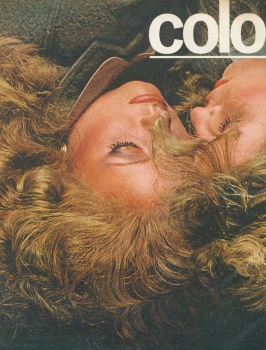


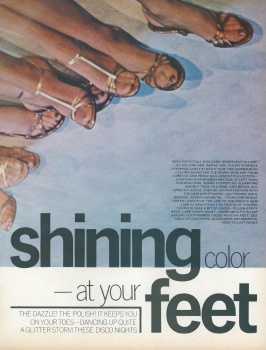
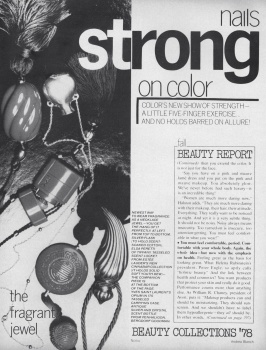
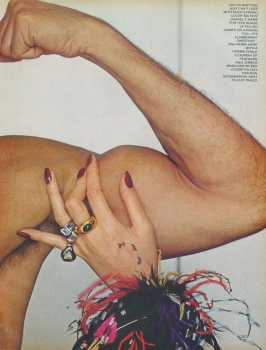
vogue archive
Beauty & Health | Beauty Collections '78, Color Is It!
Photo Arthur Elgort, Francesco Scavullo, Nobu, Stan Malinowski, Deborah Turbeville, Andrea Blanch
Models Gia Carangi, Rosie Vela, Gia Carangi, Beverly Lee, Rosemary McGrotha, Unknown
Hair Christiaan, Harry King, Garren
Makeup Way Bandy, George Newell, Nairi Moi














vogue archive
Last edited:
DreamsOfCandy
Member
- Joined
- Jun 28, 2005
- Messages
- 46
- Reaction score
- 0
Hey guys I found this on YouTube, I've actually never posted a vid before. I had never really seen Gia move in front of the camera except for the brief clips they showed in one of her interviews on her addiction. This appears to be a earlier shoot for a Cosmo cover and they are documenting Scavullo's work, in which Gia is the current subject.
http://m.youtube.com/#/watch?v=Me1-0EHIxfI&desktop_uri=/watch?v=Me1-0EHIxfI
I love that video!
 It's so very 70s/early 80s. I've watched it at least 20 times since I discovered it. Sandy Linter has a YouTube channel and she commented about this video in one her videos. She said that it was a recreation of Gia's second (?) Cosmo cover shoot - the one where she's wearing that Norma Kamali brown unitard. That makes sense because it's the same outfit, makeup and hair but the pose is different (Gia is standing in the real cover but in the video, she's leaning over a table).
It's so very 70s/early 80s. I've watched it at least 20 times since I discovered it. Sandy Linter has a YouTube channel and she commented about this video in one her videos. She said that it was a recreation of Gia's second (?) Cosmo cover shoot - the one where she's wearing that Norma Kamali brown unitard. That makes sense because it's the same outfit, makeup and hair but the pose is different (Gia is standing in the real cover but in the video, she's leaning over a table).I wish there were more footage of Gia out there. I'm still waiting on my DVD of "The Self Destruction of Gia". I ordered it a month ago!
lady stardust
Active Member
- Joined
- Nov 17, 2004
- Messages
- 11,987
- Reaction score
- 6
never seen that one before! thank you justaguy 





Hey guys I found this on YouTube, I've actually never posted a vid before. I had never really seen Gia move in front of the camera except for the brief clips they showed in one of her interviews on her addiction. This appears to be a earlier shoot for a Cosmo cover and they are documenting Scavullo's work, in which Gia is the current subject.
http://m.youtube.com/#/watch?v=Me1-0EHIxfI&desktop_uri=/watch?v=Me1-0EHIxfI
Thank you for posting this video, jay.
Fashion photography is one of my interests, but Gia is also one of my all-time favorite models. Your post is a win-win for me.

lady stardust
Active Member
- Joined
- Nov 17, 2004
- Messages
- 11,987
- Reaction score
- 6
Omg..Luuuuuv that one! 

credit:
http://www.theatlantic.com/entertai...ing-the-word-fashionista-20-years-ago/275048/
Stephen Fried author of Gia's biography discussing how and why he created the word "fashionista" 20 years ago, and yes that's the first time I heard it when I read the book.
I Apologize for Inventing the Word 'Fashionista' 20 Years Ago
In 1993, an unsuspecting Gia Carangi biographer made up a word to collectively refer to the many tiny factions within the 1970s fashion industry. Today, it's everywhere.
Stephen Fried Apr 17 2013, 8:46 AM ET
More
 Pocket Books; Flickr user Royalty.Girl
Pocket Books; Flickr user Royalty.Girl
Twenty years ago, I apparently changed language forever. I published a book that unleashed upon an unsuspecting public a single word of terrifying power and controversy. That word is "fashionista."
I suppose I should apologize to all users of language for my crime against nomenclature. I could also apologize to my wife, a writer and my editor, who lobbied loudly against the word when I invented it—and later came to believe that if we had only copyrighted it, we'd be fabulously wealthy by now. (An English major, she also did a spit-take when we learned my little word was being added to the Oxford English Dictionary.)
The love/hate people have for fashionista was best captured by well-known linguista author Ben Yagoda, who called me "Stephen Frankenstein" for creating it and the "storm it of -istas that has followed."
Related Story
It is, I must admit, weird to have invented a word. And I'm still amazed at how it happened.
Fashionista first appeared on page 100 of my 1993 book Thing of Beauty: The Tragedy of Supermodel Gia. I created it because as I was writing about the fashion industry—and young model Gia Carangi's immersion in it—there was no simple way to refer to all the people at a sitting for a magazine photo or print ad. I got tired of listing photographers, fashion editors, art directors, hairstylists, makeup artists, all their assistants, and models as the small army of people who descended on the scene. This was also the group that, according to one top fashion illustrator I interviewed, had collectively become "the famous non-famous people" at Studio 54.
Since I was re-reading a lot of the newspapers and magazines from the period of Gia's supernova career in the late '70s and early '80s, and remembering a lot of coverage of Sandanistas (and a lot of "–ista" jokes among my mag writer friends), I just decided to try it.
The word only appeared four times in the book, and it did not immediately catch on. In fact, the first mention of it, in a May 2, 1993 review in the New York Times Sunday Book Review, was a cranky one: The author, Carol Kramer, a magazine fashion editor herself, dissed my "vivid (if slightly unfair) indictment of what Mr. Fried ... who tends toward hyperbole, calls the beauty-industrial complex."
And then she b*tch-slapped me for "fashionista," saying "he makes up corny labels, too."
I never gave the word another thought, frankly, until it started showing up in the fall 1995 coverage of the European couture shows, both in the London Evening Standard and the Washington Post. A Lexis/Nexis search showed it was actually used three times in 1994, 26 times in 1995, 54 times in 1996 and 74 times in 1997.
The use of fashionista dramatically expanded in 1998, as did interest in my book, when HBO made a movie about Gia's life, starring the young (and extremely naked) Angelina Jolie. The word was used more than 200 times in U.S. newspapers that year.
And then, in 1999, came the announcement that fashionista was going to be included in the OED. This led to a full-on attack of and by the fashionistas, and a big piece on the front page of the New York Times Sunday Styles section about the rise of the word, and the many meanings it had taken on over the years. The writer, Penelope Green, went around to many top fashion people and asked them what fashionista meant, and if they were fashionistas.
Donatella Versace was quoted as saying "I am a fashionista and proud of it." Fashion editor legend Polly Mellen said the word meant nothing to her but wondered if it connoted a "fashion victim?" Tiffany Dubin, then head of the fashion department at Sotheby's, said, "Oh, I aspire to be a fashionista, to be hip, fun, ever-knowing. I don't think fashionistas are victims."
I have been fascinated by all the different meanings the word has taken on, many of them pretty arch. I never meant the word as an insult. I think it's fair that the word has grown to refer to people in the so-called "fashion mafia." But I never really thought it was right for the word to be used to accuse people of being "fashion victims." Honestly, part of the research and writing of Thing of Beauty involved a writer for national magazines (at the time I was working for GQ and Vanity Fair) crossing the divide between the word people on the editorial staff, to the visual people on the art direction and beauty side, and taking their world seriously as a subject for investigative and personal reporting.
As a result, some of my best friends are fashionistas (at least by my original definition.)
Twenty years later, the word is everywhere—most recently and annoyingly in a bombardment of T.J. Maxx commercials. It sits happily in its place it the OED, which defines it as "a person employed in the creation or promotion of high fashion, such as a designer, photographer, model, fashion writer, etc. Also: a devotee of the fashion industry; a wearer of high-fashion clothing."
Since the entry does include fashion writers, I guess that means I am technically a fashionista. Although, if you saw me sitting here in my unfashionable office wearing the same t-shirt and jeans for the second day in a row, I doubt that's the first word that would come to mind.
http://www.theatlantic.com/entertai...ing-the-word-fashionista-20-years-ago/275048/
Stephen Fried author of Gia's biography discussing how and why he created the word "fashionista" 20 years ago, and yes that's the first time I heard it when I read the book.
I Apologize for Inventing the Word 'Fashionista' 20 Years Ago
In 1993, an unsuspecting Gia Carangi biographer made up a word to collectively refer to the many tiny factions within the 1970s fashion industry. Today, it's everywhere.
Stephen Fried Apr 17 2013, 8:46 AM ET
More

Twenty years ago, I apparently changed language forever. I published a book that unleashed upon an unsuspecting public a single word of terrifying power and controversy. That word is "fashionista."
I suppose I should apologize to all users of language for my crime against nomenclature. I could also apologize to my wife, a writer and my editor, who lobbied loudly against the word when I invented it—and later came to believe that if we had only copyrighted it, we'd be fabulously wealthy by now. (An English major, she also did a spit-take when we learned my little word was being added to the Oxford English Dictionary.)
The love/hate people have for fashionista was best captured by well-known linguista author Ben Yagoda, who called me "Stephen Frankenstein" for creating it and the "storm it of -istas that has followed."
Related Story
It is, I must admit, weird to have invented a word. And I'm still amazed at how it happened.
Fashionista first appeared on page 100 of my 1993 book Thing of Beauty: The Tragedy of Supermodel Gia. I created it because as I was writing about the fashion industry—and young model Gia Carangi's immersion in it—there was no simple way to refer to all the people at a sitting for a magazine photo or print ad. I got tired of listing photographers, fashion editors, art directors, hairstylists, makeup artists, all their assistants, and models as the small army of people who descended on the scene. This was also the group that, according to one top fashion illustrator I interviewed, had collectively become "the famous non-famous people" at Studio 54.
Since I was re-reading a lot of the newspapers and magazines from the period of Gia's supernova career in the late '70s and early '80s, and remembering a lot of coverage of Sandanistas (and a lot of "–ista" jokes among my mag writer friends), I just decided to try it.
The word only appeared four times in the book, and it did not immediately catch on. In fact, the first mention of it, in a May 2, 1993 review in the New York Times Sunday Book Review, was a cranky one: The author, Carol Kramer, a magazine fashion editor herself, dissed my "vivid (if slightly unfair) indictment of what Mr. Fried ... who tends toward hyperbole, calls the beauty-industrial complex."
And then she b*tch-slapped me for "fashionista," saying "he makes up corny labels, too."
I never gave the word another thought, frankly, until it started showing up in the fall 1995 coverage of the European couture shows, both in the London Evening Standard and the Washington Post. A Lexis/Nexis search showed it was actually used three times in 1994, 26 times in 1995, 54 times in 1996 and 74 times in 1997.
The use of fashionista dramatically expanded in 1998, as did interest in my book, when HBO made a movie about Gia's life, starring the young (and extremely naked) Angelina Jolie. The word was used more than 200 times in U.S. newspapers that year.
And then, in 1999, came the announcement that fashionista was going to be included in the OED. This led to a full-on attack of and by the fashionistas, and a big piece on the front page of the New York Times Sunday Styles section about the rise of the word, and the many meanings it had taken on over the years. The writer, Penelope Green, went around to many top fashion people and asked them what fashionista meant, and if they were fashionistas.
Donatella Versace was quoted as saying "I am a fashionista and proud of it." Fashion editor legend Polly Mellen said the word meant nothing to her but wondered if it connoted a "fashion victim?" Tiffany Dubin, then head of the fashion department at Sotheby's, said, "Oh, I aspire to be a fashionista, to be hip, fun, ever-knowing. I don't think fashionistas are victims."
Twenty years later, the OED defines it as "a person employed in the creation or promotion of high fashion, such as a designer, photographer, model, fashion writer, etc. Also: a devotee of the fashion industry; a wearer of high-fashion clothing."
Columnist Michael Musto said he used the word all the time even though he was "not really sure what I mean by it ... it's one of those wonderful words like 'tofu' that could mean anything you want depending on the inflection." I have been fascinated by all the different meanings the word has taken on, many of them pretty arch. I never meant the word as an insult. I think it's fair that the word has grown to refer to people in the so-called "fashion mafia." But I never really thought it was right for the word to be used to accuse people of being "fashion victims." Honestly, part of the research and writing of Thing of Beauty involved a writer for national magazines (at the time I was working for GQ and Vanity Fair) crossing the divide between the word people on the editorial staff, to the visual people on the art direction and beauty side, and taking their world seriously as a subject for investigative and personal reporting.
As a result, some of my best friends are fashionistas (at least by my original definition.)
Twenty years later, the word is everywhere—most recently and annoyingly in a bombardment of T.J. Maxx commercials. It sits happily in its place it the OED, which defines it as "a person employed in the creation or promotion of high fashion, such as a designer, photographer, model, fashion writer, etc. Also: a devotee of the fashion industry; a wearer of high-fashion clothing."
Since the entry does include fashion writers, I guess that means I am technically a fashionista. Although, if you saw me sitting here in my unfashionable office wearing the same t-shirt and jeans for the second day in a row, I doubt that's the first word that would come to mind.
I just found this one, by Denis Piel. Never seen it before...
denispiel.com
I love this picture and I, too, have never seen it before.

Thanks for posting the article, angel222. What's funny is that I just reread Thing of Beauty last week. I definitely remember the "fashionista" reference.
depechegirl
Active Member
- Joined
- Mar 9, 2006
- Messages
- 305
- Reaction score
- 51
Wow, amazing!!
Sweet rus
Well-Known Member
- Joined
- May 27, 2005
- Messages
- 18,801
- Reaction score
- 249
Model At Work: Carol Alt & Sandy Linter Discuss Gia Carangi.
there are more videos on Sandy Linter's youtube channel but I post just a couple of them
there are more videos on Sandy Linter's youtube channel but I post just a couple of them
Similar Threads
- Replies
- 42
- Views
- 17K
- Replies
- 70
- Views
- 24K
Users who are viewing this thread
Total: 2 (members: 0, guests: 2)
New Posts
-
-
-
-
-
Jonathan Anderson - Designer, Creative Director of JW Anderson & Christian Dior (13 Viewers)
- Latest: Frederic01

